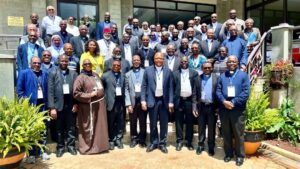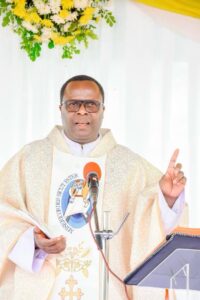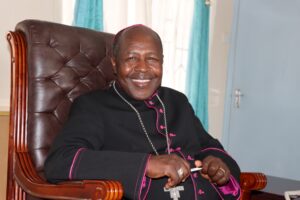JCAM/AMECEA: Synodal Journey Calls for Implementation of Ordinary Activities: African Panelists
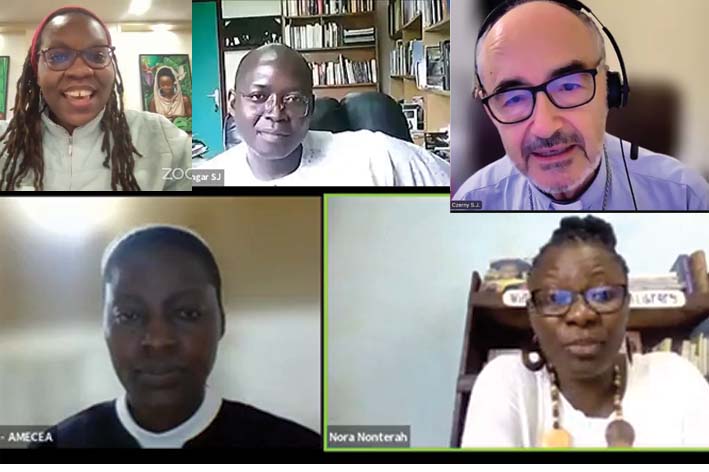
Sr. Jecinter Antoinette Okoth, FSSA
“Our daily African experience of life is rich enough to provide reflection material we can use in order to contribute to the universal synodality process,” African panelist has shared at a Webinar session urging the African Church to uphold the cultural values that brought the people together for this is what synodality calls for.
Responding to the input given by the Prefect of the Vatican’s Dicastery for Promoting Integral Human Development (PIHD) His Eminence Michael Cardinal Czerny during the launch of a book published by the African Synodality initiative (ASI), Fr. Rodrigue Mianro Naortangar highlighted that, “Our cultures and ways of lives provide synodal potentialities for the universal Church.” Besides, “Using our traditional and cultural potentialities can help us to contribute in an original way to the process of synodality in the Church.”
The ASI is a partnership between the Jesuit Conference of Africa and Madagascar (JCAM), the Symposium of the Episcopal Conferences of Africa and Madagascar (SECAM), and the Association of Member Episcopal Conferences in Eastern Africa (AMECEA), whose goal is to generate creative ideas and resources that help support the local churches in Africa and enable them engage fruitfully and constructively in the ongoing synodal process which will culminate next year 2023.
After Cardinal Czerny emphasized during his reflection on Wednesday, September 28, that the paradigm of “walking together” should steer synodal process in Africa, Fr. Naortangar a member of the Society of Jesus (SJ) who heads the Jesuit Institution of Theology (ITCJ) press in Abidjan, Ivory Coast narrated that, “Living together effectively, undertaking projects together, even if the starting point comes from a single person, are lessons which we learn from the experience of walking together.”
“Being a church goes along with being on the road, because the church is not to be considered as a building but as an assembly of people walking together on the road, facing or cherishing diversity, living newness and creativity proper to the Holy spirit,” Fr. Naortangar one of the theologian contributors to the ASI publication narrated to about 100 online participants during the e-book launch adding that, “the synod on synodality invites us to refuse the status quo in order to be always on the move as far as our identity as church is concerned, namely continuously listening and discerning better for our church.”
On her part stressing on the need for the African Church to implement ordinary activities for the realization of a successful synod, Dr. Nora Nonterah a theological and comparative ethicist and also a contributor to the ASI publication, appreciated Pope Francis’ call for Africans during this synodal process, “to revisit the rich style of being a Church which brings hope to and demands renewal from every single member of the Church.” 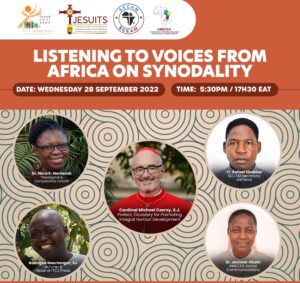
She noted that the style proposed by the Pontiff, “is characterized by a method of listening and journeying together where all members of the Church ought to matter equally though in different capacities and functions, hence it encourages faith that is lived in every context and every situation taking every cultural and social context seriously.”
Even though the aspect of journeying together is not alien to the African wisdom since there has been the tradition of listening to all adult voices in matters affecting the society, narrated Dr. Nonterah a lecturer at the Religious Studies Department, Kwame Nkrumah University of Science and Technology, Ghana, “historical events have threatened the usage and relevance of some important dynamics in the African cultural contexts.”
She disclosed activities including Kabane-ka-ni, Palaver or the Barasa which were used in Africa as conversational and dialogical model for decision-making within the community for peace and progress and stressed that these, “could be done among the youths, women and elders on issues affecting the community, problems, uncertainties, sensitive issues and strange unexplainable events.”
“This always calls for communicative action and societal conversation on matters that affect the society, family, clan and community at large. It involves the creation of space both as an ideology, a way of viewing life as togetherness where all voices matter and also as a pragmatic creation of space of encounter,” the Ghanaian theologian related the African approach to what is expected in the synod on synodality adding that, “it is a moment for everyone to feel being a recognized as part of the family, speak out, and learn through listening to the views of others, most often that which is contrary to one’s own views.”
Additionally, Dr. Nonterah continued, this approach “offers a number of opportunities: A sense of belonging and relevance, appreciation and validation. Most importantly it is a time of learning and formation, understanding what information is lacking while gaining new perspectives of the family, clan or community.”
In her sharing during the Wednesday Webinar, Dr. Nonterah suggested the need to view synodality as a critical opportune moment for the Church in Africa, to offer some insights to enrich the current style of being a Church.
“It is a time to rethink how to upend the matrix of erasure of the wisdom of the local people, in the Church, which is currently playing out in the hierarchical model of being a Church,” she said adding that, “Synodality, is a time for all members of the Church family of God to refocus on the relevance and centrality of baptism as the source of our common priesthood, kingship and prophets.”
